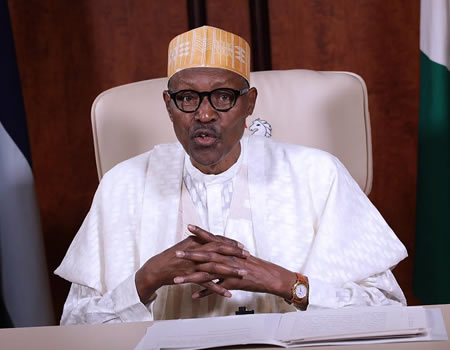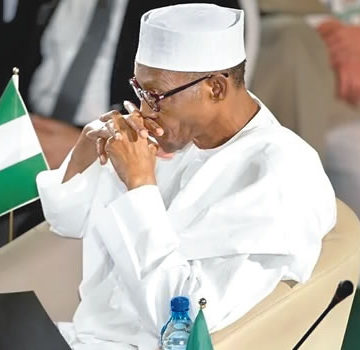He made this known during the induction ceremony of the first indigenous Unmanned Aerial Vehicle (UAV) ‘TSAIGUMI’ held at the Nigerian Air Force (NAF) base Kaduna on Thursday.
Buhari noted that with the successful launching of the UAV, it was a clear proof that his administration is interested in the development of local contents not only in the military but across other sectors of the economy.
The President, who spoke extensively on the UAV expressed his satisfaction with efforts of the current leadership of NAF saying, the significance of the milestone of national technological development cannot be over-estimated.
According to him, the world is witnessing an ever increasing surge in the employment of Unmanned Aerial Vehicles in military operations because, while standard air weapons such as missiles, fighters and bombers work against well-defined targets like conventional enemy forces or installations, they are not as useful in today’s complex wars that are fought against adversaries who are often hidden amongst innocent populations or in locations similarly sensitive or difficult to strike by normal conventional means.
“Unmanned Aerial Vehicle can loiter and maintain an ‘‘unblinking stare’’ over a chosen area for hours. Thanks to the ability to ‘‘watch and wait’’, its operator, often miles away, can provide a continuous stream of vital information on enemy activities and if the platform is weaponised, it patiently chooses the best moment to engage.
“Thus the employment of Unmanned Aerial Vehicle capabilities for intelligence, surveillance and reconnaissance and where possible, strike operations significantly increases the chances of success while minimising unwanted collateral damage.
“Government remains determined, despite numerous challenges to bring about the much-needed CHANGE that will lift our beloved nation to its rightful place as a major economic and political force on the world stage.
“As I outlined in my New Year Day broadcast to the nation, this administration has designed series of key projects to dramatically overhaul national infrastructure and overcome the deficit in that vital area.
“Let me once more commend the gallant men and women of the Nigerian Armed Forces and other security agencies, for their tireless efforts towards defeating Boko Haram and all other threats to our nation’s security, thus ensuring that the government can proceed with its developmental activity without hindrance.
“From the military perspective, the added capacity for Intelligence, Surveillance and Reconnaissance provided by the TSAIGUMI will boost ongoing and future security operations. As this project moves into the next stage, which is mass production, it would create employment and possibly generate revenue as Nigeria’s first military export product.
“We remain determined to overcome all challenges to our security and development as a nation. I enjoin all well-meaning Nigerians to join hands with us to make our collective dreams of greatness a reality”, he urged.
Earlier, Chief of Air Staff (CAS), Air Marshal Sadique Baba Abubakar said, the desire to have battlespace dominance and awareness has increased especially with the increasing complexity of contemporary security challenges and the moral burden that has been placed on professional Armed Forces to conduct military operations with precision and minimum collateral damage.
He said that was why the need for capacity development in the area of UAVs and other scientific and technological innovations has been foremost in his mind since he assumed the leadership of the Air Force.
“I, therefore, consider research and development as a fundamental enabler of capacity building, hence ‘strategic partnerships with MDA for enhanced research and development’ features as one of the key drivers of my vision. what we are doing in the NAF in terms of promotion of R&D is in line with the STI policy.
“NAF will continue to support mechanisms to harness, promote, commercialise and diffuse locally developed technologies for the production of globally competitive goods and services that intensively utilise Nigeria’s raw materials not only for the NAF and by extension the Nigerian Armed Forces but also for national development”, he added.
ALSO READ: Buhari seeks international help to tackle climate change effects
The CAS, however, highlighted some of the physical and performance parameters of the TSAIGUMI including a wingspan of 5.16 metres and a maximum take-off mass of 95kg, Electro-Optic/Infra-Red (EO/IR) camera system while its engine runs on a 50:1 MOGAS/Oil mixture.
It requires only 300 metres of the runway for operation, with a mission range of 100km, a service ceiling at 15,000 feet and operational endurance of about 10 hours. The performance parameters and operational characteristics would make this platform a critical component of NAF ISR architecture.
Consequently, the UAV would be mass produced and employed in theatres of operations across the country, added the CAS.







